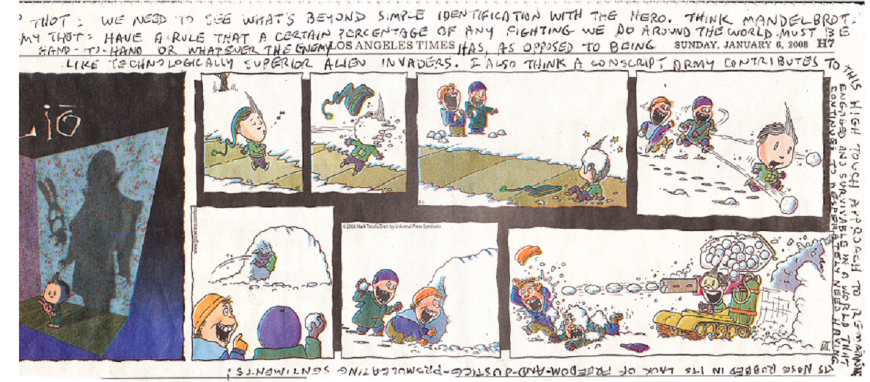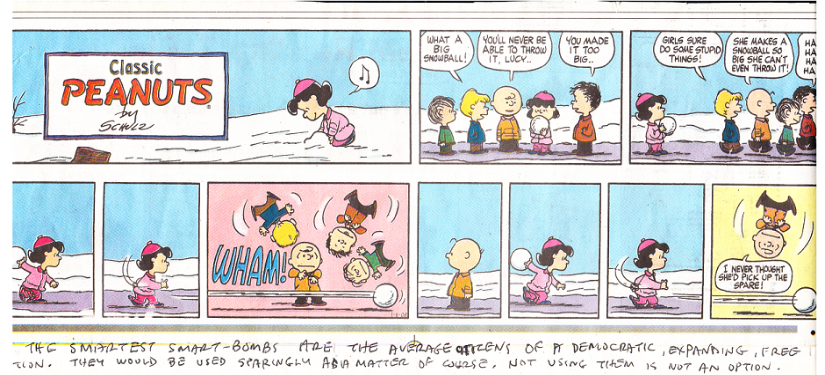| third-14 |
home
home
home
home
home
home
| Wooden Ships Iron Men Wherein Manifest Destiny is discussed, along with Atavistic Concepts like White Man's Burden and accomplishing something because you didn't know you Couldn't |

| deep thot: We need to see what's beyond simple identification with the hero. Think Mandelbrot (fractal derived by plotting an equation which goes through imaginary quantities to arrive at solutions, and which has many corners that look alike until you turn them...). my thot: Have a rule that a certain percentage of any fighting we do around the world must be hand-to-hand or whatever the enemy has, as opposed to being like technologically superior alien invaders. I also think a conscript army contributes to this high touch approach to remaining engaged and survivable in a world that continues to desperately need having its nose rubbed in its lack of freedom-and-justice-promulgating sentiments! |

| deep thot: The smartest smart-bombs are the average citizens of a democratic, expanding, free nation. They would be used sparingly as a matter of course. Not using them is not an option. |
| Part of 1957 epilogue to Abridged WWII Memoirs A great part of the Second World War had run its course to defer the land bridge where Africa and Asia meet, to maintain our oil supplies, and guard the Suez Canal. In the process the Middle Eastern countries, and notably Egypt, had enjoyed the advantage of protection from German and Italian invasion at no cost to themselves. There followed further increase in the number of independent states that existed in the former domains of the Ottoman Empire. The departure of the French from Syria and the Lebanon was bitter to them but inevitable. No one can claim that we ourselves have derived any advantage there. Throughout this region the world has witnessed a surge of nationalist feeling, the consequences of which have yet to run their course. From Indonesia to Morocco the Moslem peoples are in ferment. Their assertiveness has confronted the Western Powers, and especially those with overseas responsibilities, with problems of peculiar difficulty. Amid jubilant cries for self-government and independence, it is easy to forget the many substantial benefits that have been conferred by Western rule. It is also hard to replace the orderliness which the Colonial Powers exercised over these large areas by a stable new system of sovereign states. The most intractable of all the difficulties that faced Britain in these regions was Palestine. Ever since the Balfour Declaration of 1917 I have been a faithful supporter of the Zionist cause. I never felt that the Arab countries had had anything from us but fair play. To Britain, and Britain alone, they owed their very existence as nations. We created them; British money and British advisers set the pace of their advance; British arms protected them. We had, and I hope have, many loyal and courageous friends in the area. The late King Abdullah was a most wise ruler. His assassination removed a chance of a peaceful settlement of the Palestinian tumult. King Ibn Saud was a most staunch ally. In Iraq I followed with admiration the sagacious and brave Nuri es-Said, who most faithfully served his monarch and led his country on a path of wisdom, unaffected by threats from without or foreign-bought clamour at home. Unfortunately these men were exceptions. As mandatory power Great Britain was confronted with the tortuous problem of combining Jewish immigration to their national home and safeguarding the rights of the Arab inhabitants. Few of us could blame the Jewish people for their violent views on the subject. A race that has suffered the virtual extermination of its national existence cannot be expected to be entirely reasonable. But the activities of terrorists, who tried to gain their ends by the assassination of British officials and soldiers, were an odious act of ingratitude that left a profound impression. There is no country in the world less fit for a conflict with terrorism than Great Britain. This is not because of weakness or cowardice; it is because of restraint and virtue, and the way of life which we have lived in our successfully defended island. Stung by the murders inPalestine, abused by the Middle Eastern countries, and even by our allies, it was not unnatural that the British Government of the day should finally wash its hands of the problem and in 1948 leave the Jews to find their own salvation. The brief war that ensued dramatically dispelled the confidence of the Arab countries who closed in for an easy kill. The inffective violence of the birth of the State of Israel has sharpened the difficulties of the Middle East ever since. I look with admiration on the work done there in building up a nation, reclaiming the desert and receiving so many unfortunates from Jewish communities all over the world. But the outlook is sombre. The position of the hundreds of thousands of Arabs driven from their homes and existing precariously in the no man's land created round Israel's frontiers is cruel and dangerous. The frontiers of Israel flicker with murder and armed raids, and the Arab countries profess irreconcilable hostility to the new State. The more far-sighted Arab leaders cannot voice counsels of moderation without being howled down and threatened with assassination. It is a black and threatening scene of unlimited violence and folly. One thing is clear. Both honour and wisdom demand that the State of Israel should be preserved, and that this brave, dynamic, and complex race should be allowed to live in peace with its neighbours. They can bring to the area an invaluable contribution of scientific knowledge, industriousness and productivity. They must be given an opportunity of doing so in the interest of the whole Middle East. * * * Before I complete this brief survey of the things that have struck me since the war, let us have a look at the United Nations. The machinery of international government may easily fail in its purpose. My idea as the end of the war approached was that the greatest minds and the greatest thoughts possessed by men should govern the world. This en¬tailed, if all countries great and small were to be represented, that they must be graded. The spectacle presented by the United Nations is no more than a vain assertion of equality of influence and power which has no relation to the actual facts. The result is that a process of ingenious lobbying has attempted to take possession of the government of the world. I say attempted, because the vote of a country of a million or two inhabitants cannot decide or even sway the actions of powerful states. The United Nations in its present form has to cringe to dictatorships and bully the weak. Small states have no right to speak for the whole of mankind. They must accept, and they would accept, a more intimate but lower rank. The world should be ruled by the leading men of groups of countries formed geographically. The mere process of letting the groups shape themselves and not judging by their power or their num¬bers would tell its own tale. I do not intend to suggest that all the efforts and sacrifices of Britain and her allies recorded in the six volumes of my War Memoirs have come to nothing and led only to a state of affairs more dangerous and gloomy than at the beginning. On the contrary, I hold strongly to the belief that we have not tried in vain. Russia is becoming a great com¬mercial country. Her people experience every day in growing vigour those complications and palliatives of human life that will render the schemes of Karl Marx more out of date and smaller in relation to world problems than they have ever been before. The natural forces are working with greater freedom and greater opportunity to fertilise and vary the thoughts and the power of individual men and women. They are far bigger and more pliant in the vast structure of a mighty empire than could ever have been conceived by Marx in his hovel. And when war is itself fenced about with mutual extermination it seems likely that it will be increasingly postponed. Quarrels between nations, or continents, or combinations of nations there will no doubt continually be. But in the main human society will grow in many forms not comprehended by a party machine. As long therefore as the free world holds together, and especially Britain and the United States, and maintains its strength, Russia will find that Peace and Plenty have more to offer than exterminatory war. The broadening of thought is a process which acquires momentum by seeking opportunity for all who claim it. And it may well be if wisdom and patience are practiced that Opportunity-for-All will conquer the minds and restrain the passions of mankind. WINSTON S. CHURCHILL Chartwell, Westerham, Kent February 10,1957 |
| Telegram to Anthony Eden, Churchill's Foreign Secretary and confidante, one month before Yalta: Treatment of Germany after the war. It is much too soon for us to decide these enormous questions. Obviously, when the German organised resistance has ceased the first stage will be one of severe military control. This may well last for many months , or perhaps for a year or two, if the German underground movement is active.... I have been struck at every point where I have sounded opinion at the depth of the feeling that would be aroused by a policy of "putting poor Germany on her legs again." I am also well aware of the arguments about "not having a poisoned community in the heart of Europe." I do suggest that, with all the work we have on our hands at the present moment, we should not anticipate these very grievous discussions and schisms, as they may become. We have a new Parliament to consider, whose opinion we cannot foretell. I shall myself prefer to concentrate upon the practical issues which will occupy the next two or three years, rather than argue about the long-term relationship of Germany to Europe.... It is a mistake to try to write out on little pieces of paper what the vast emotions of an outraged and quivering world will be either immediately after the struggle is over or when the inevitable cold fit follows the hot. These awe-inspiring tides of feeling dominate most people's minds, and independent figures tend to become not only lonely but futile. Guidance in these matters is granted to us only step by step, or at the utmost a step or two ahead. There is therefore wisdom in reserving one's decisions as long as possible and until all the facts and forces that will be potent at the moment are revealed. |

